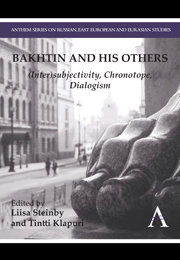Book contents
- Frontmatter
- Contents
- Acknowledgments
- Translation and Transliteration
- Introduction: The Acting Subject of Bakhtin
- Chapter 1 Bakhtin and Lukács: Subjectivity, Signifying Form and Temporality in the Novel
- Chapter 2 Bakhtin, Watt and the Early Eighteenth-Century Novel
- Chapter 3 Concepts of Novelistic Polyphony: Person-Related and Compositional-Thematic
- Chapter 4 Familiar Otherness: Peculiarities of Dialogue in Ezra Pound's Poetics of Inclusion
- Chapter 5 Author and Other in Dialogue: Bakhtinian Polyphony in the Poetry of Peter Reading
- Chapter 6 Tradition and Genre: Thomas Kyd's The Spanish Tragedy
- Chapter 7 Bakhtin's Concept of the Chronotope: The Viewpoint of an Acting Subject
- Chapter 8 The Provincial Chronotope and Modernity in Chekhov's Short Fiction
- List of Contributors
Chapter 5 - Author and Other in Dialogue: Bakhtinian Polyphony in the Poetry of Peter Reading
Published online by Cambridge University Press: 05 May 2013
- Frontmatter
- Contents
- Acknowledgments
- Translation and Transliteration
- Introduction: The Acting Subject of Bakhtin
- Chapter 1 Bakhtin and Lukács: Subjectivity, Signifying Form and Temporality in the Novel
- Chapter 2 Bakhtin, Watt and the Early Eighteenth-Century Novel
- Chapter 3 Concepts of Novelistic Polyphony: Person-Related and Compositional-Thematic
- Chapter 4 Familiar Otherness: Peculiarities of Dialogue in Ezra Pound's Poetics of Inclusion
- Chapter 5 Author and Other in Dialogue: Bakhtinian Polyphony in the Poetry of Peter Reading
- Chapter 6 Tradition and Genre: Thomas Kyd's The Spanish Tragedy
- Chapter 7 Bakhtin's Concept of the Chronotope: The Viewpoint of an Acting Subject
- Chapter 8 The Provincial Chronotope and Modernity in Chekhov's Short Fiction
- List of Contributors
Summary
The Problem of Bakhtinian Terminology and Poetry
Much of the terminology developed by Bakhtin seems eminently suitable for the analysis of poetry; yet, due to his valorization of novelistic over poetic discourse, we might well hesitate to do so, at least if we follow Bakhtin's insistence on the novel's social relevance and meaning, as opposed to poetry's – alleged – inherently monologic and authoritative tendencies.
His concept of the novel as being allied with the centrifugal forces of culture, associated with the anti-canonical, the anarchic, with dialogic discourse, contrasts starkly with his conception of poetry as monologic. He de facto accuses poetry of tending toward the authoritarian or at least towards the solipsistic recreation of a single consciousness:
The language of poetic genres, when they approach their stylistic limit, often becomes authoritarian, dogmatic and conservative, sealing itself off from the influence of extraliterary social dialects. Therefore such ideas as a special ‘poetic language’, a ‘language of the gods’, a ‘priestly language of poetry’ and so forth could flourish on poetic soil.
(Bakhtin 1981, 273)- Type
- Chapter
- Information
- Bakhtin and his Others(Inter)subjectivity, Chronotope, Dialogism, pp. 73 - 86Publisher: Anthem PressPrint publication year: 2013



